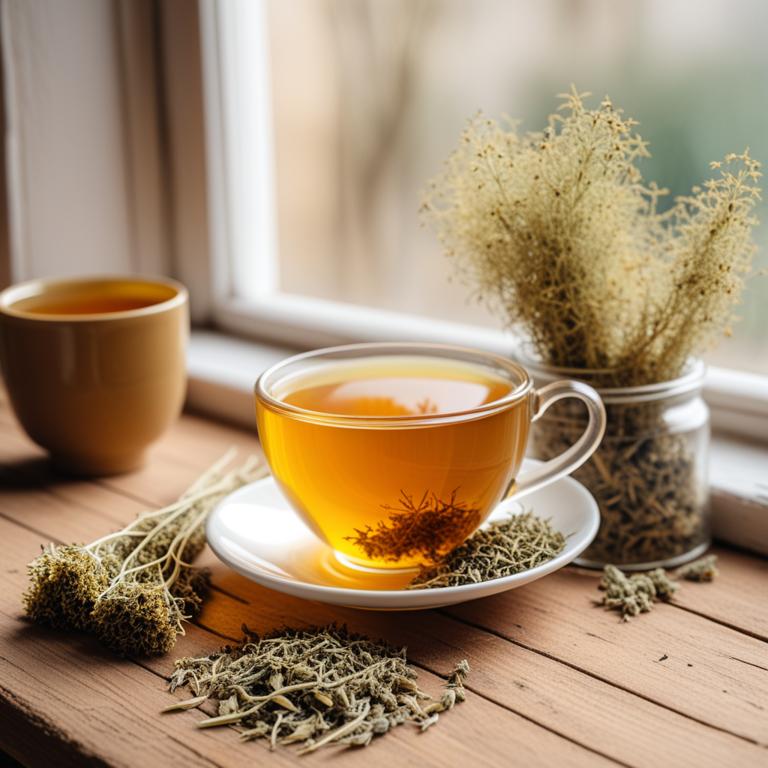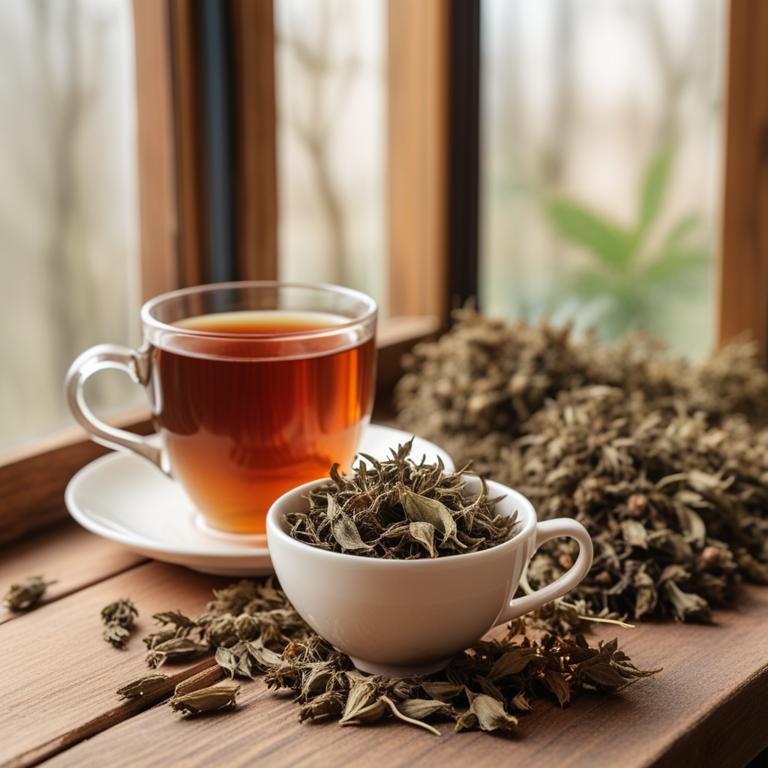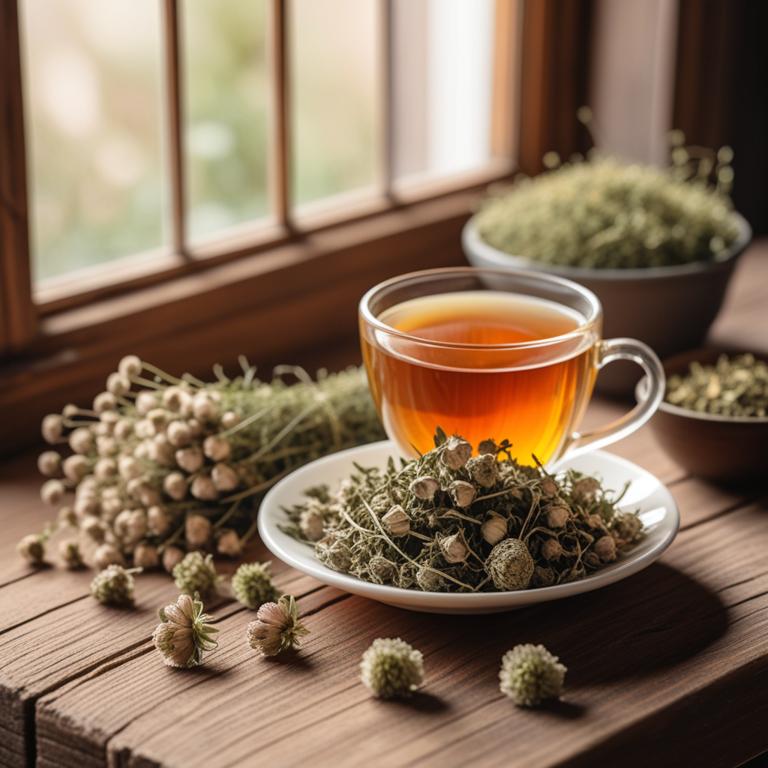11 Best Herbal Teas For Upset Stomach

Herbal teas for upset stomach are a natural remedy made from the leaves, roots, or flowers of various plants, used to alleviate digestive discomfort and soothe the stomach.
These teas have numerous benefits, including reducing inflammation, relieving nausea and bloating, and promoting relaxation, making them an excellent alternative to over-the-counter medications.
Some popular examples of herbal teas used to treat upset stomach include peppermint tea, which eases digestion and calms the stomach, ginger tea, which helps to reduce nausea and inflammation, chamomile tea, which promotes relaxation and soothes the digestive system, licorice root tea, which soothes the stomach lining and reduces inflammation, fennel tea, which aids digestion and reduces bloating, and dandelion tea, which stimulates digestion and reduces water retention.
By incorporating these herbal teas into your diet, you can effectively alleviate symptoms of an upset stomach and maintain a healthy digestive system.
According to "Journal of evidence-based complementary & alternative medicine", teas for upset stomach have been found to be effective in reducing the frequency of defecation and improving stool consistency, specifically black tea showing a possible antidiarrheal effect in pediatric patients with acute nonbacterial diarrhea.
Below there's a list of the 11 best herbal teas for upset stomach.
- 1. Zingiber officinale teas
- 2. Silybum marianum teas
- 3. Thymus vulgaris teas
- 4. Glycyrrhiza glabra teas
- 5. Foeniculum vulgare teas
- 6. Rheum palmatum teas
- 7. Hypericum perforatum teas
- 8. Melissa officinalis teas
- 9. Valeriana officinalis teas
- 10. Cinnamomum verum teas
- 11. Trifolium pratense teas
Also you may be interested in...
TODAY'S FREE BOUNDLE
Herb Drying Checklist + Herbal Tea Shopping List + Medicinal Herbs Flashcards
Enter you best email address below to receive this bundle (3 product valued $19.95) for FREE + exclusive access to The Aphotecary Letter.
$19.95 -> $0.00
1. Zingiber officinale teas

Zingiber officinale teas, also known as ginger teas, have been traditionally used to treat upset stomach ailments due to their anti-inflammatory and carminative properties.
The bioactive constituents of ginger teas, including gingerols and shogaols, help to reduce inflammation, alleviate nausea, and alleviate digestive discomfort by blocking the production of stomach acid and relaxing the intestinal muscles.
By consuming ginger teas, individuals can experience relief from symptoms such as bloating, cramps, and vomiting, making it a beneficial herbal preparation for treating upset stomach ailments.
The benefits of ginger teas include not only rapid relief from stomach discomfort but also potential long-term prevention of stomach ulcers and other gastrointestinal disorders.
Related Study
According to "Alternative therapies in health and medicine", Zingiber officinale teas for upset stomach may be effective in alleviating nausea and vomiting in pregnant women, with 77% of subjects receiving ginger experiencing at least a 4-point improvement on the nausea scale after 9 days.
2. Silybum marianum teas

Silybum marianum teas, also known as milk thistle tea, have been traditionally used to treat upset stomach ailments due to their anti-inflammatory and antioxidant properties.
The flavonoids and silymarin in this herbal preparation help to soothe the stomach lining, reduce inflammation, and protect the liver from damage caused by toxins, thereby alleviating stomach discomfort and nausea.
The bioactive constituents, particularly silybin and silidianin, have been shown to inhibit the production of pro-inflammatory enzymes and cytokines, which contribute to stomach irritation and pain.
The benefits of Silybum marianum teas in treating upset stomach ailments include rapid relief from symptoms, improved digestion, and enhanced overall liver function.
3. Thymus vulgaris teas

Thymus vulgaris teas, also known as thyme tea, have been traditionally used to treat upset stomach ailments due to their carminative and antispasmodic properties.
The herbal preparation helps to treat this ailment by reducing inflammation and alleviating digestive discomfort, allowing the stomach to recover from nausea and vomiting.
The bioactive constituents of thyme tea, including thymol and carvacrol, exhibit antimicrobial and anti-inflammatory properties that contribute to its therapeutic effects on the stomach.
Regular consumption of thymus vulgaris teas can provide relief from stomach upset and promote overall digestive health, making it a beneficial herbal remedy for individuals experiencing nausea and stomach discomfort.
Related Study
According to "PloS one", Thymus vulgaris teas for upset stomach may be beneficial in reducing ulcer area and promoting mucus secretion and pH of gastric content, making it a potential remedy for gastroprotection against gastric ulcers.
4. Glycyrrhiza glabra teas

Glycyrrhiza glabra teas, also known as licorice root tea, have been traditionally used to treat an upset stomach due to its anti-inflammatory and soothing properties that help to calm the stomach lining and reduce inflammation.
The bioactive constituents of Glycyrrhiza glabra, including glycyrrhizin and flavonoids, have been shown to have a protective effect on the stomach mucosa, reducing symptoms such as nausea, vomiting, and diarrhea.
By reducing inflammation and protecting the stomach lining, Glycyrrhiza glabra teas can help to alleviate the discomfort and pain associated with an upset stomach, promoting a faster recovery and improved digestive health.
The benefits of using Glycyrrhiza glabra teas to treat an upset stomach include reduced symptoms, improved digestion, and a lower risk of stomach ulcers and other complications.
Related Study
According to the study, Glycyrrhiza glabra teas for upset stomach may be beneficial due to its potential anti-ulcer activity, which can help prevent or cure peptic ulcers caused by various factors.
5. Foeniculum vulgare teas

Foeniculum vulgare teas, also known as fennel tea, have been traditionally used to treat upset stomach ailments due to their carminative and anti-inflammatory properties.
The herbal preparation helps to treat this condition by soothing the digestive tract, reducing inflammation, and promoting the relaxation of muscles in the stomach, which in turn alleviates symptoms such as bloating, cramps, and nausea.
Foeniculum vulgare tea contains bioactive constituents like anethole and limonene, which have been shown to exhibit anti-spasmodic and anti-inflammatory effects, thereby providing relief from stomach discomfort.
The benefits of using fennel tea to treat upset stomach ailments include its non-invasive nature, ease of preparation, and affordability, making it a popular natural remedy for individuals seeking a holistic approach to digestive health.
Related Study
According to the study, Foeniculum vulgare teas for upset stomach have not been directly studied, but fennel seed oil has been shown to reduce intestinal spasms and increase motility of the small intestine, which could potentially alleviate symptoms of an upset stomach.
6. Rheum palmatum teas

Rheum palmatum teas have been traditionally used to treat the upset stomach ailment, known as dyspepsia, due to their ability to soothe and calm the digestive system.
This herbal preparation helps to treat the ailment by reducing inflammation and alleviating symptoms such as bloating, nausea, and abdominal pain.
The bioactive constituents of Rheum palmatum teas, including tannins, flavonoids, and saponins, contribute to their therapeutic effects by inhibiting the growth of bacteria and reducing the production of stomach acid.
The benefits of using Rheum palmatum teas to treat the upset stomach ailment include improved digestion, reduced symptoms, and a decrease in the risk of complications such as ulcers and gastritis.
7. Hypericum perforatum teas

Hypericum perforatum teas, also known as St. John's Wort, have been traditionally used to treat upset stomach ailments due to their anti-inflammatory and antispasmodic properties, which help to soothe and calm the digestive system.
The bioactive constituents, including flavonoids, phenolic acids, and terpenoids, in these teas work together to reduce inflammation, alleviate pain, and regulate bowel movements, ultimately providing relief from stomach discomfort.
By reducing inflammation and promoting relaxation, Hypericum perforatum teas help to treat upset stomach ailments by alleviating symptoms such as nausea, bloating, and abdominal cramps.
The benefits of using Hypericum perforatum teas to treat upset stomach ailments include improved digestion, reduced inflammation, and a sense of calm and relaxation.
Related Study
According to "Journal of integrative medicine", Hypericum perforatum teas for upset stomach have been found to exhibit gastroprotective mechanisms, which include reducing Helicobacter pylori growth, gastritis, erosion of the stomach lining, and hemorrhage.
8. Melissa officinalis teas

Melissa officinalis teas, also known as lemon balm tea, have been traditionally used to treat upset stomach ailments due to their calming and soothing properties.
The bioactive constituents of Melissa officinalis, including rosmarinic acid, apigenin, and luteolin, help to reduce inflammation and alleviate digestive discomfort, making it an effective herbal remedy for soothing an upset stomach.
By reducing inflammation and promoting relaxation, Melissa officinalis teas help to treat upset stomach ailments by calming the digestive system and alleviating symptoms such as nausea and bloating.
The benefits of using Melissa officinalis teas for upset stomach ailments include promoting a sense of calm, reducing digestive discomfort, and providing a natural and non-invasive treatment option.
Related Study
According to "Iranian Red Crescent medical journal", Melissa officinalis teas for upset stomach may have gastroprotective effects, reducing the severity of gastric ulcers in rats by enhancing antioxidant defenses and inhibiting lipid peroxidation.
9. Valeriana officinalis teas

Valeriana officinalis teas have been used for centuries to treat upset stomach ailments, and their properties make them an effective remedy for soothing digestive issues.
The herbal preparation contains valerenic acid, isovaleric acid, and valepotriates, which are bioactive constituents that help to calm the stomach and reduce inflammation.
By promoting relaxation and reducing spasms in the digestive tract, Valeriana officinalis teas help to alleviate symptoms such as nausea, bloating, and cramps associated with an upset stomach.
The benefits of using Valeriana officinalis teas to treat this ailment include natural, non-addictive relief from digestive discomfort, and improved overall gut health.
10. Cinnamomum verum teas

Cinnamomum verum teas, derived from the bark of the Ceylon cinnamon tree, have been traditionally used to treat upset stomach ailments due to their anti-inflammatory and carminative properties.
The herbal preparation helps to treat this ailment by alleviating nausea, reducing inflammation, and regulating digestion, thereby providing relief from symptoms such as bloating, cramps, and diarrhea.
The bioactive constituents of Cinnamomum verum teas, including cinnamaldehyde and eugenol, have been found to possess gastroprotective and antimicrobial properties that help to soothe the stomach lining and prevent infections.
The benefits of using Cinnamomum verum teas to treat upset stomach ailments include natural and effective relief, reduced risk of side effects, and a non-addictive alternative to conventional medications.
11. Trifolium pratense teas

Trifolium pratense teas, also known as red clover teas, have been traditionally used to treat upset stomach ailments due to their anti-inflammatory and soothing properties.
The bioactive constituents present in this herbal preparation, including isoflavones and coumarins, help to reduce inflammation and relax the digestive tract, thereby alleviating stomach discomfort.
The isoflavones in Trifolium pratense teas have been shown to possess antispasmodic effects, which help to calm the digestive system and prevent excessive contractions that can lead to stomach upset.
Regular consumption of Trifolium pratense teas has been found to provide relief from stomach ailments, promote digestive health, and even help to regulate menstrual cycles in some individuals.